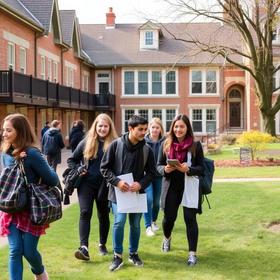Boarding School Scholarships and Financial Aid: A Parent’s Guide
For many families, the dream of sending a child to boarding school feels out of reach because of high tuition. The reality, however, is that financial aid and scholarships make boarding schools accessible to a wide range of students. In fact, nearly 40–45% of boarding school students receive some form of financial assistance.
This guide explains what types of aid are available, how to apply, and what families can realistically expect to pay in 2025.
Understanding Boarding School Costs
Before diving into scholarships, it helps to understand the full cost of attendance.
Tuition:Covers academic instruction.
Room and Board: Includes housing, meals, and student services.
Additional Fees: Technology, health, activities, textbooks, and travel.
In 2025, the average boarding school tuition is between $60,000 and $80,000 per year, depending on the school and location. Five-day boarding options average around $55,000, while seven-day boarding averages about $69,000.
Types of Boarding School Financial Aid
1. Need-Based Aid
Most aid is need-based and calculated from a family’s income, assets, and household circumstances. Schools typically use third-party evaluators to determine eligibility.
2. Merit Scholarships
Some schools offer awards for academic excellence, artistic talent, athletic ability, or leadership. These scholarships are less common but can significantly reduce tuition.
3. Full-Ride Scholarships and Income Caps
A growing number of top boarding schools offer full scholarships for families below certain income levels, or they cap tuition as a percentage of family income. This trend is making elite schools more accessible to middle-income families.
Benchmarks: Schools with Strong Financial Aid Programs
Here are examples of well-known boarding schools with generous aid policies:
| School | Boarding Cost (2025) | % on Financial Aid | Notable Financial Aid Details |
| Deerfield Academy | $74,440 | 40% | Avg grant $60,850 (82%), free for household income < $150K (Wikipedia, Wall Street Journal) |
| Groton School | $59,995 | 40–44% | Families under $150K attend free; avg grant ~$46,500 (Wikipedi |
| Blair Academy | $75,900 | 36% | Avg boarding aid grant: $54,896 (Wikipedia) |
| Episcopal High School | $74,900 | ~36% | Avg grant ~$54,619 (Wikipedia) |
| Choate Rosemary Hall | $67,380 (2023–24) | 34% | Avg aid covers ~80% of tuition, meets full need (Wikipedia |
| Lawrenceville School | $79,500 (2024–25) | 34% | Avg boarding grant > $60,000; need-based (Wikipedia) |
Key Takeaway: Sticker prices are high, but actual family contributions can be far lower. Many middle-income households pay a fraction of listed tuition.
Frequently Asked Parent Questions
1. Does applying for aid hurt admission chances?
No. At most boarding schools, financial aid consideration is separate from admission decisions. Many elite schools state explicitly that applying for aid will not negatively impact acceptance.
2. How do schools calculate my contribution?
Schools typically use an Expected Family Contribution (EFC) model, similar to college aid. Third-party services such as Clarity or School and Student Services (SSS) review financial documents and calculate what your family can afford.
3. What about international students?
Some schools extend need-based aid to international students, though funds may be more limited. Schools with larger endowments tend to support more global applicants.
4. What percentage of students actually get aid?
At selective boarding schools, between 34% and 44% of students receive financial aid. This is higher than the overall U.S. private school average, which is closer to 24%.
5. Are student-teacher ratios affected by aid?
No. Student-faculty ratios remain low regardless of a family’s financial situation. Many schools average between 6:1 and 8:1, ensuring strong academic support for all students.
Demographics and Access
Financial aid also plays a role in increasing diversity:
Groton School: 53% students of color, 14% international.
Lake Forest Academy: 25% international, 34% domestic students of color, 33% on financial aid.
Choate Rosemary Hall: Roughly one-third of students on aid, with a 7:1 student–faculty ratio.
These statistics show that scholarships are not only financial tools but also vehicles for broadening representation and inclusivity on campus.
How to Apply for Boarding School Scholarships
Start Early:Applications often open 9–12 months before the school year begins.
Complete the Aid Forms: Submit financial documents through Clarity, SSS, or the school’s own system.
Explore External Scholarships: Some independent organizations also fund boarding school tuition.
Ask About Income Caps: Policies like Deerfield’s free tuition under $150K income can make elite schools unexpectedly affordable.
Internal Resources to Help Parents
For more information, check out these related articles and school profiles:
How to Evaluate Boarding Schools – A parent’s checklist for comparing options.
Private Schools in Florida – Regional profiles including tuition and financial aid.
AP Programs in Private Schools – Learn how advanced coursework can tie into merit scholarship opportunities.
Lake Forest Academy Profile – A diverse community where one-third of students receive financial aid.
Mercersburg Academy Profile – Tuition, aid percentage, and student life details.
Final Thoughts: Making Boarding School Affordable
Sticker Price ≠ Actual Cost:Families often pay much less than the published tuition.
One-Third to Nearly Half of Students Receive Aid: Generous scholarships are common, particularly at top schools with large endowments.
Aid Increases Diversity and Access: Financial assistance allows schools to welcome students from a wide range of backgrounds.
Parents Should Explore Policies Early: From merit awards to income-based tuition caps, opportunities exist to make boarding school affordable.
With careful research and timely applications, parents may find that boarding school is not only attainable but also an investment that pays lifelong dividends.












